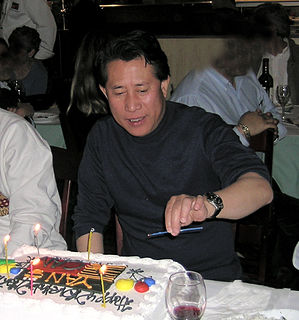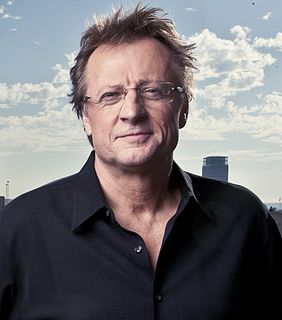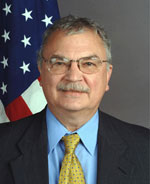A Quote by Robert Kennedy
I think we can end the divisions within the United States. What I think is quite clear is that we can work together in the last analysis. And that what has been going on with the United States over the period of that last three years, the divisions, the violence, the disenchantment with our society, the divisions - whether it's between blacks and whites, between the poor and the more affluent, or between age groups, or in the war in Vietnam - that we can work together. We are a great country, an unselfish country and a compassionate country. And I intend to make that my basis for running.
Quote Topics
Affluent
Age
Age Group
Analysis
Basis
Been
Between
Blacks
Clear
Compassionate
Country
Disenchantment
Divisions
End
Going
Great
Great Country
Groups
Intend
Last
Make
More
Our
Our Society
Over
Period
Poor
Quite
Running
Society
States
Think
Three
Three Years
Together
United
United States
Unselfish
Vietnam
Violence
War
Whether
Whites
Within
Work
Work Together
Years
Related Quotes
What we need in the United States is not division; what we need in the United States is not hatred; what we need in the United States is not violence or lawlessness; but love and wisdom, and compassion toward one another, and a feeling of justice toward those who still suffer within our country, whether they be white or they be black.
The razor-sharp line of division that exists between political ideologies in our own country in the United States, I think it's clear that these movements are forming - and one is more forward thinking and more embracing and more inclusive. The other is less tolerant and more judgemental and more fear-driven and fear-based. I think, you know, over the next generation, we're going to see which way we turn as a civilisation.
On both of my major trips to North Korea, the leaders of the country made it plain that they want to make progress towards doing away with nuclear weapons and towards ending the longstanding, official state of war which persists between North Korea and the United States and South Korea, a war which has continued since the ceasefire over fifty years ago. That sort of thing happens quite often when we meet with people who are kind of international outcasts with whom the government of the United States won't meet.
In the Islamic world, the U.S. is seen in two quite different ways. One view recognizes what an extraordinary country the U.S. is.The other view is of the official United States, the United States of armies and interventions. The United States that in 1953 overthrew the nationalist government of Mossadegh in Iran and brought back the shah. The United States that has been involved first in the Gulf War and then in the tremendously damaging sanctions against Iraqi civilians. The United States that is the supporter of Israel against the Palestinians.
It should come as no surprise that Russia continues its effort to manipulate Western democracies in a way to sow discord and disagreements between our countries in NATO and within the United States or any other Western European country. And it's something the United States obviously must be on guard against.
By the end of the 1960s, the United States owned more than half of the Indian rupee money supply, and that had been acquired through food aid. So I think it's very interesting to see the very long history of how sovereignty and food go together. When some countries remove another country's ability to feed itself, it is a very powerful tool. Imperialist countries, like the United Kingdom, like the United States, have used it for centuries.
In 2006, I became the fist American to be allowed to go visit their astronaut center in China in Beijing. I think that it makes sense for the U.S. to work with China in the future and I hope to see, if the political atmosphere between the United States and China allow for us to do more cooperation together, especially in the area of human space flight. I think in the same way that it's help improve the relations between the U.S. and Russia; it would help to improve the relations between the U.S. and China.
In the United States the White House has appointed two different independent panels who had full access to classified information for the last 10 years that master balance has been in place in the United States, and they found that despite intercepting the calls - everybody in the country, - it had never stopped a single terrorist attack. So the question is, why would these officials be pursuing these policies, if we know they don't work, if they don't stop terrorism?

































